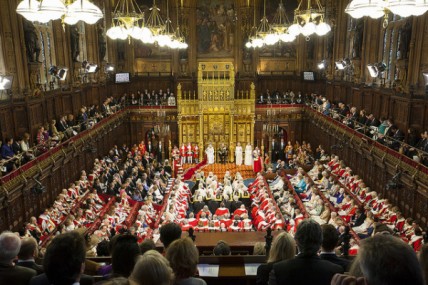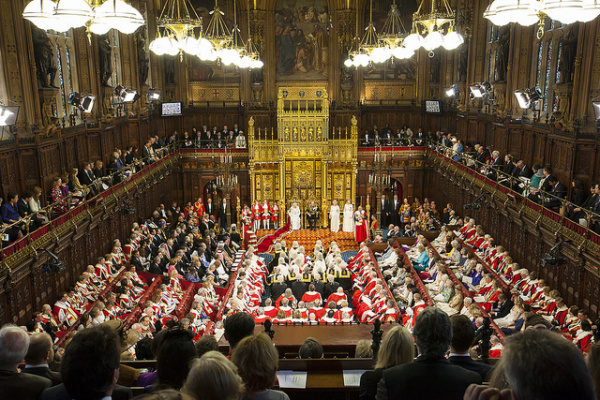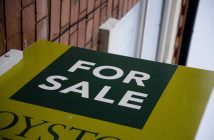
House of Lords. Photograph courtesy of Parliamentary Copyright/Roger Harris
The House of Lord’s select committee on internal reforms recommended that all major faiths be represented within Britain’s upper house. This has not been implemented. It would be helpful for both religious communities, and Britain as a whole, to engage on several key policies involving religion with permanent representatives from religious communities. Permanent represents can provide both specialist knowledge and practical engagement from their communities. Currently we see permanent representation only for the Anglican community, some limited representation for the Catholic and Jewish populations and no formal representation for the other faith groups of the UK.
One can see the benefits in a wide variety of different fields. Engagement with legal procedure is vital for the integrity of the rule of law in the UK. In contrast, we can see this being eroded at the juncture of civil and religious law. For instance in the field of divorce where a growing number of Muslims are seeking separate religious procedures as well as formal civil procedures.
Furthermore policing and security has long been an important issue for minority faith communities. Members of minority faith communities as varied as the Catholic community of Northern Ireland and the Muslim community of Bradford face higher arrest and incarceration rates. It is important for policy-making to have formally-enshrined religious representation for their communities, as these communities see their religious identities as more important than their national ones. State involvement with the religious world is important, and can also arise in previously unexpected arenas. One can see this from the Satanic verses controversy, which left the government of the time both shocked and wrong footed by a world which was outside their field of knowledge.
Currently, the Anglican church holds 26 of the 720 seats in the House of Lords. Although this is a small percentage their ability to voice their opinion and raise objections has been seen to be crucial. Meanwhile the Presbyterian church of Scotland, the other official religion of Great Britain, does not have formal representation. The Jewish community is currently represented by Jonathan Sacks. He was given a lifetime peerage, as have all Chief Rabbis since 1988. Therefore the place for the head of Judaism in the House of Lords is not formally enshrined, but is a tradition. In addition to this the Catholic church is represented by the hereditary peer, the Duke of Norfolk. He has historically been a figurehead for the Catholic community, but only a figurehead: the role provides limited actual representation for the Catholic community. One can see this from the Catholic community’s use of the Lords spiritual to raise question in Parliament rather than their supposed representative. In addition there is an informal group of secular Lords who support the interests of secularism.
However, there are several keys reasons why the multi-faith reforms advocated by the House of Lords is unlikely to, and maybe shouldn’t, happen. Firstly and most crucially, is the disillusionment in the role of the Anglican bishops in the House of Lords and growing secularism. Growing secularism has been cited by all major religions as a threat to their political representation. We can see this in the fact that 56% of the British pubic want to see the removal of the Lords Spiritual. Secularism is a large and growing phenomena in Western Europe and is likely to continue, and necessarily stands in the way of increased religious representation.
Secondly, unlike in other countries and in contrast with other religion in the UK, many of the most practised religions are not centralised, this was cited in the Wakehom commission as the largest hurdle for a multi-faith group within Britain’s second house. Rabbi Sacks, for instance, represents a community which often does not see him as their leader, and this has can be seen to be a problem also for the Muslim and Hindu communities of Britain. It also leaves open the possibility of political favouritism to schools of thought which the government most agrees with, as has been seen by New Labour’s close relationship with the Muslim Council of Britain.
Finally, reforms of the House of Lords have been notoriously difficult in all matters, and would surely be even more so on such an emotive reform. This can be seen from the major opposition which has emerged from Iain McLean’s representation scheme – under which a total of 77 peers representing religious communities would need to be appointed – which has been spoken about at great length in both houses of Parliament but which has not been actioned.
One can see the current representation for faiths in the second house as being anachronistic, unrepresentative and antiquated. However, this may be said of the House of Lords as a whole. Genuine multi-faith representation in the House of Lords is unlikely to be introduced for the same practical reasons as any reforms in the upper house are consistently difficult to perform. In addition to this, the religious nature of the scheme are in contrast to an increasingly laïc state.
Written by Liam Keenan




